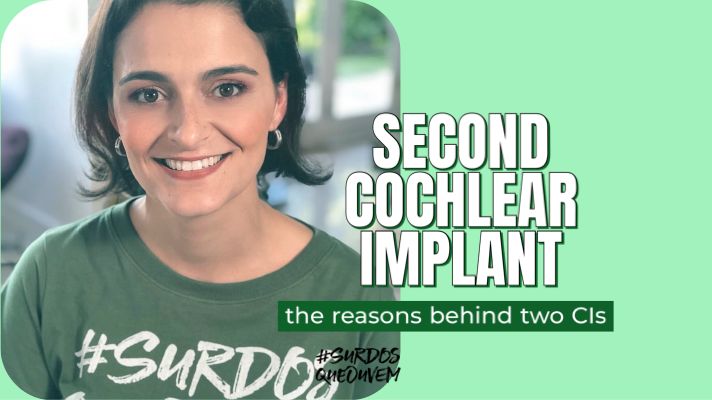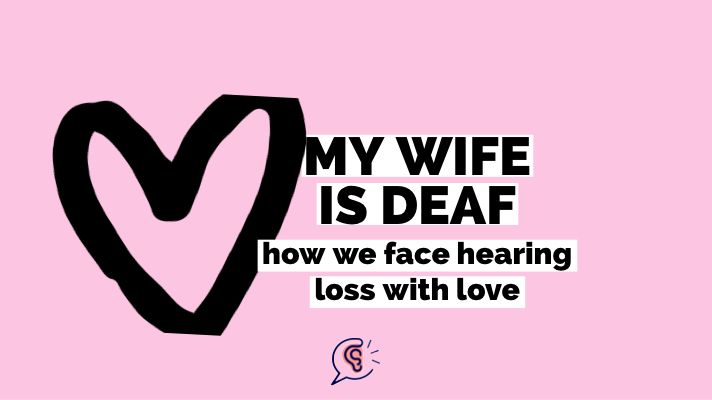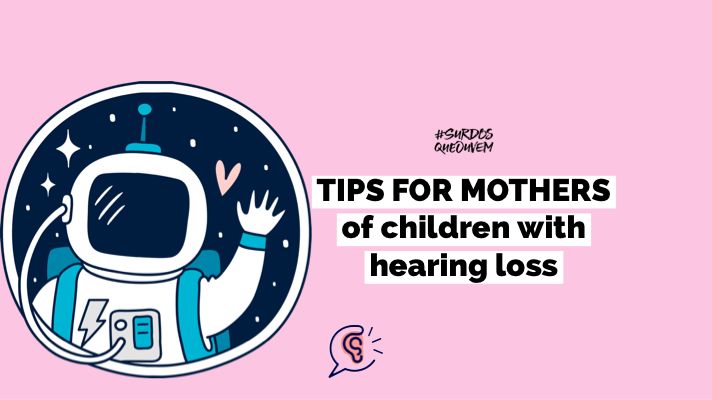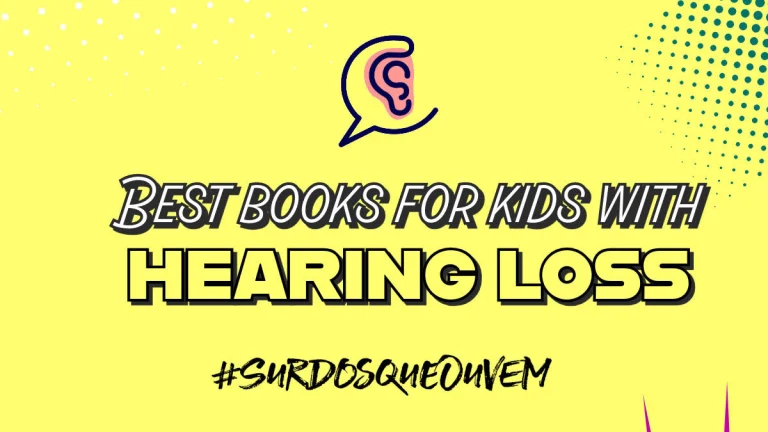SECOND COCHLEAR IMPLANT: The reasons why I have two CIs
The bilateral Cochlear Implant surgery, in my case, was a long decision. Only three years after my first Cochlear Implant, and after my mother’s death I started thinking seriously about it. What was different about the second CI was that it had special participation from my husband, who is an ENT doctor who specialized in hearing loss, Dr Luciano Moreira. I underwent surgery at Copa D’Or Hospital in June 2016, in Rio de Janeiro, Brazil.
Here are the reasons why I decided to have a second cochlear implant:
Physical lack of hearing on the left side
I genuinely started to consider the bilateral CI because I began to physically miss hearing on the left side. My life in Rio de Janeiro is very dynamic.
Here, I talk to people all day long at SONORA Clinic, I am always running errands to solve problems that require communication, I am constantly picking up the phone, I go out to formal and informal dinner meetings several times a week, and I travel a lot.
In other words, I communicate with people thousand times more and in a thousand times more challenging ways than before. I have once caught myself passing the phone to my left ear, unintentionally, so that the right ear could take a break after hanging on a customer service call for 40 minutes. Can you believe it?!
Localizing sounds
Anywhere I go, I need to choose well where I’m going to sit based on my sound localization, and sometimes it really pisses me off. Not to mention that in several situations I catch myself all turned sideways, trying to hear someone’s voice I was not waiting for and who suddenly sat to my left and started talking to me.
Another recurring situation: I can’t identify which side the sound came from when I’m in front of two elevators, and when the doorbell rings because my house has two doors, one to the right and one to the left with a 5-meter distance between them.
Tinnitus
The tinnitus on the left side is still the same: a humming quite unpleasant and with low-frequency. If I didn’t have tinnitus, maybe I wouldn’t want to have a bilateral CI, but as I have it and as I am living proof that the CI decreases tinnitus by almost 100%, this was another key factor in my decision.
There are some days when I get absolutely annoyed when I realize that I listen wonderfully well on the right side and on the left I have this endless humming.
The thought of “killing” tinnitus once and for all brings me great happiness. While I am using the CI, the tinnitus in my right ear disappears completely, and when I take it off at night, if I focus and pay attention to it, I can notice it less intensely than before. I’d say about 80% less intense.
Hearing Aids
As the first CI had a very rapid and satisfactory evolution compared to the hearing aids, I ended up not wearing hearing aids on the left side as I should. My residual hearing decreased rapidly.
While using it, I notice that the combination of hearing aids + CI can be wonderful if both are in sync: my voice sounds better, people’s voices get even more clear and full of details, the bass sound comes powerfully and differently, and any noise is louder…
Too bad it didn’t exist back in January 2015 when I upgraded… if I had moderate or severe hearing loss in the left ear, I wouldn’t have the second CI.
But my hearing loss is now profound in such a way that even with the hearing aids in the highest volume, I can only hear gibberish. Not to mention that I got unaccustomed to the molds inside the ear and even more so to the after-use stratospheric tinnitus.
Loss of taste
The loss of taste on the right side was also something that held me back. I was scared to death of having a CI on the left side and losing my taste forever- can you imagine hearing everything but no longer feeling the taste of anything?? Since I had the surgery, I have had round trips with my right tastebuds.
For several months I did not feel the taste of food. For several months my tongue was a living thing and it was difficult to deal with it, after all, your tongue is something you don’t even remember you have. It was tingling all day long. There was a time when my taste came back and I thought I was ‘cured’ forever.
Then it left again. Today I can feel the taste of food, but I still have this feeling of a living tongue, although much less than before. I’m not saying I have completely lost my fear, but I decided to take the risk.
The psychological side
The psychological side also influenced my decision. 2015 was a very tense and complicated year in my life and I didn’t have much time or peace to think straight. I met the doctor who performed my first CI surgery, Dr Lavinsky, in 2015, and he asked me about bilateral CI. I said I hadn’t made up my mind yet. I waited until I was sure of what I wanted since everyone who came to talk to me on this subject already started with that opinion of “but hooooow won’t you do the other side?”, “why the hell haven’t you done it yet?”, and so on.
I have talked to many CI users and the opinions are quite different. I remember this person who told me he was very happy with a one-sided CI and zero complaints, and when he did the bilateral, he happened to get to the end of the day extremely tired and irritated. Most say they have a better understanding of speech in noisy environments, and that discrimination of where the sound comes from is improved.
Upcoming challenges
Finally, I was thinking about the upcoming challenges that I will still face in life, and in which of them I would like to already be a bilateral user. Then I realized that if I become a mother and happen to still be a one-sided user, I think I would remain one-sided forever – I can imagine the fear of going under the knife after one decides to have a child. It’s better to be prepared in case this happens, after all, I have got to the crucial age to make this decision – I turn 35 in September, help.
I am fully aware that the first Cochlear Implant revolutionized my entire life, revolutionized my existence, my soul, everything. The second CI will not do this.
Someone made an interesting analogy these days for me: the first was like the first child, and the second was like the second child. You already know how it is, you already know the joys and the nuisances, and you already know what to expect. Therefore, with no great emotions. Lol! Of course, I will be very moved if everything goes well and if I hear something on the day of activation. It will have been worth it to go through this experience again.
The second cochlear implant will be another fresh start for me, but the new beginnings don’t scare me anymore. It was them who brought me happiness and made me realize that, with courage, life is zillions of times more interesting.
Lessons from my second cochlear implant
The second Cochlear Implant taught me lessons I teach every day.
First, the CI activation is a moment that can be very frustrating. Second, we should not have any kind of expectations about that day. To be honest, today I see the activation in a completely different way: it is only the beginning of a journey that will lead our brain to work in a way that it does not know yet. Nothing more than that. It is a moment of new pieces of information, and it is the beginning of decoding these pieces.
When I activated the first CI, I felt different, because I just wanted to confirm my theory that the CI would allow me to hear a little louder than I heard with the hearing aids. When I activated the second one, I wanted to prove my theory that right there I would hear with my left ear in a very similar way to how I was hearing with my right CI. The disappointment happened instantly because the smart girl here wanted MORE than she got.
It turns out that the human brain is indeed the most interesting and amazing thing of all. In less than 10 minutes my brain had a ‘click’ and understood that it is better to listen with two CIs than with only one. When the audiologists turned off the left side and left me with only the right side, I felt an instant agony! I was already missing that little weird sound I had just gotten. I bet other CI users also have this same feeling when their entire body recognizes a piece of information their brain recently learned. It’s indescribable-just being a cyborg to understand the wave of energy and enthusiasm that the whole body unleashes at that very moment.
Fear of undergoing a surgery
When I looked into the possibility of being a candidate for the Cochlear Implant, in 2013, my doctor said it was possible, that I was a candidate for the bilateral CI. However, just like any person with profound hearing loss on Earth, I was extremely attached to that hearing I thought I had. That’s right, I thought I had it! Only after I started listening with a Cochlear Implant did I understand completely that it could not be considered hearing, let alone a satisfactory hearing, as I used to believe. I used to tell everyone that I could handle it very well and that I was feeling great that way, and the worst thing is that I truly believed in it. How could someone who was 100% dependent on lip-reading and who always came home every day cross-eyed and destroyed by the mental fatigue caused by hearing loss consider herself ‘feeling great’? Honestly…
When someone with profound hearing loss asks to talk to me, either at SONORA, by e-mail or on Facebook, their speech generally is identical to mine in 2013, before I had the CI: “I can hear everything, I just don’t understand it, so I need to lip-read“, or “I’m fine this way, I can hear everything with my hearing aids“. Guys, this is not true. I understand and respect the fact that each one has its own pace, but we can’t argue with the truth.
What does profound hearing loss mean?
No one is thriving or hears everything when with profound hearing loss, even with the best hearing aids out there. This is being delusional and in denial. No one is forced to go for cochlear implantation if they can and have the chance, but we have to understand what profound hearing loss means in our lives.
In my life, it meant not understanding human speech; hearing noises and being aware that something was happening but not knowing what; panicking just with the thought of being in the dark (someone who has profound hearing loss becomes deaf and blind in the dark); going through a multitude of embarrassing and exhausting situations; being dependent on other people for a thousand basic things like listening to the doorbell or solving anything on the phone. In short, profound hearing loss only made me heartbreak, made me miss out on good opportunities, and isolated me from the world.
This talk “I listen to everything, I just don’t understand” it’s almost like saying “I’ve gained 100kg, I just don’t fit into my pants size 2“. Can you understand the correlation? I didn’t have a bilateral cochlear implant right away because I was scared, since it was big news, and I was guided by the reports and experiences of others – let you have never panicked at the thought of the possible voices of Donald Duck cast the first stone. Today when I think about my train of thought from 2013, that if one ear with CI didn’t turn out nice I would still have the other, I laugh, because it was after the CI that I understood neither ear was still good for anything at that time. If one ear with CI didn’t turn out nice, it wouldn’t be the other with profound hearing loss that would be my salvation.
Follow your heart but do not stop being rational
You have to do what your heart tells you, of course. Mine told me to hold on, out of fear and insecurity. The moment I activated my first Cochlear Implant, even with that weird, low-pitched sound at the beginning, my brain instantly noticed that it was infinitely advanced when compared to what I could hear with the combination of profound hearing loss + hearing aids.
There, the regret for not having done both CIs at once was immediate. It took me two and a half years before I had the courage and the true will to go through it all again.
Evaluate your decision more rationally than emotionally, if you can. Making up one’s mind about one CI is already a difficult decision, not to mention about two of it. If I can advise those who have profound hearing loss with an indication for cochlear implantation, there is only one thing I can say: do it! You have nothing left to lose, but you have a whole noisy world to gain if everything goes well, and the odds are good – doctors are very careful when recommending such surgery! If I could go back in time, I would have done the bilateral operation right away, in 2013, undoubtedly.
** This post was translated to the English by Isabella Vitoria Ramalho
ANY QUESTIONS?
Paula Pfeifer is a brazilian writer. Two of her books about hearing loss, hearing aids and cochlear implants can be found in english and spanish in Kindle.
Support Paula Pfeifer’s work. She is a hearing rehabilitation activist in Brazil and she is deaf herself – two cochlear implants. You can support here!
SOCIAL MEDIA I AM DEAF BUT I CAN HEAR
RECEIVE OUR NEWSLETTER
CliCK HERE to receive Surdos Que Ouvem Newsletter







